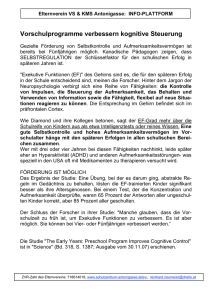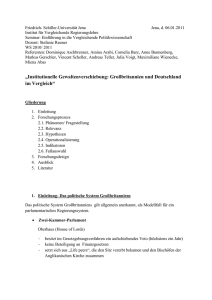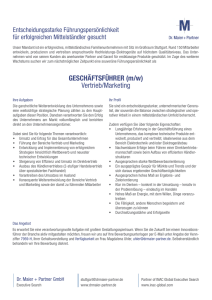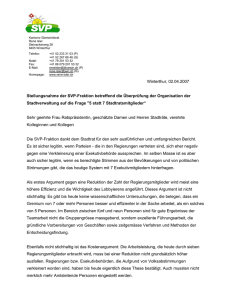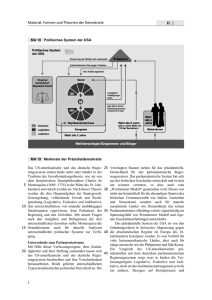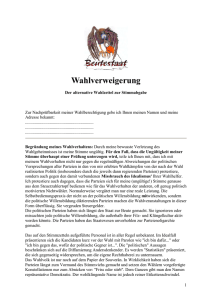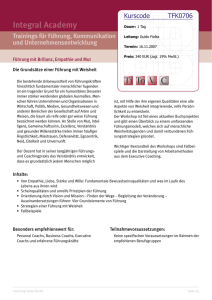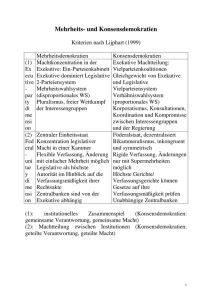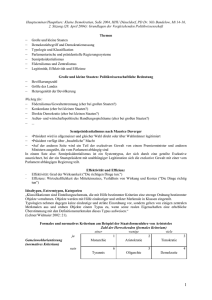Polski model władzy wykonawczej na tle porównawczym
Werbung
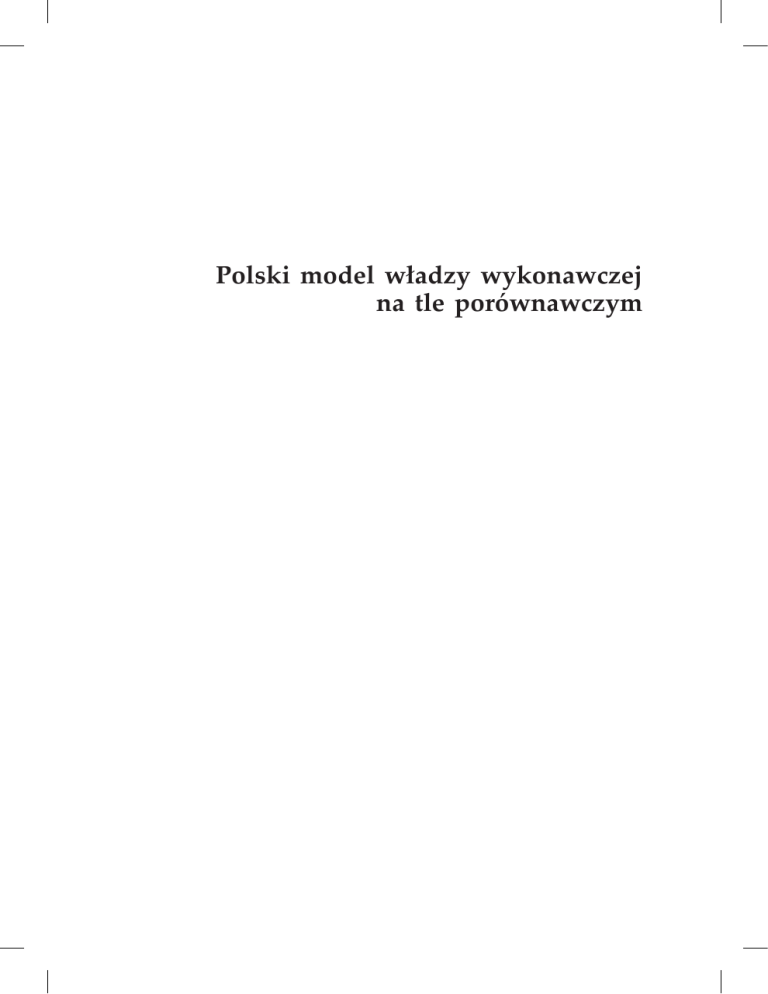
Polski model władzy wykonawczej na tle porównawczym Polski model władzy wykonawczej na tle porównawczym pod redakcją Anny Łabno Uniwersytet Śląski • Katowice 2015 Recenzent Krzysztof Skotnicki Wydane na prawie maszynopisu gwarantowanego Projektant okładki Ewa Bieniak-Haremska Redaktor techniczny Małgorzata Pleśniar Łamanie Alicja Załęcka Copyright © 2015 by Uniwersytet Śląski Wszelkie prawa zastrzeżone ISBN 978­‑83­‑8012-412-7 Wydawca Uniwersytet Śląski ul. Bankowa 12, 40­‑007 Katowice Wydanie I. Ark. druk. 7,75. Ark. wyd. 7,5. Papier offset. kl. III, 90 g Cena 20 zł (+ VAT) Druk i oprawa: „TOTEM.COM.PL Sp. z o.o.” Sp.K. ul. Jacewska 89, 88­‑100 Inowrocław Spis treści Wstęp 7 Jan Sobiech Konstytucyjna pozycja prezydenta w polskim oraz węgierskim modelu egzekutywy 9 Paweł Króliczek Procedury kreacyjne rządów. Studium komparatystyczne ze szczególnym uwzględnieniem regulacji polskiej 25 Agata Pyrzyńska „Król mówi – król słucha – król mediuje” – o sposobie kreacji rządu w krajach Beneluksu Robert Trzaskowski Premier w systemie egzekutywy Wielkiej Brytanii 43 61 Piotr Maciaszek Wpływ partii politycznych na sprawowanie władzy wykonawczej w systemach parlamentarno­‑gabinetowym i półprezydenckim na przykładzie Polski i Francji 73 Marek Suska Komisja wspólna rządu i instytucji lub środowiska społecznego – próba definicji 91 6 Spis treści Jacek Czaja, Weronika Orłowska „Gdzie wzmógł się grzech, tam jeszcze obficiej polała się łaska” – czyli prawo łaski w Polsce i innych krajach europejskich na tle porównawczym 107 Summary 121 Zusammenfassung 123 Wstęp W dniach 12–13 grudnia 2013 roku Koło Naukowe Prawa Konstytucyjnego „Spiritus Constitutionis” działające na Wydziale Prawa i Administracji Uniwersytetu Śląskiego zorganizowało VI Ogólnopolski Zjazd Kół Naukowych Prawa Konstytucyjnego. Zjazd ten odbywa się corocznie w różnych ośrodkach akademickich Polski i jak zawsze jego przedmiotem są konferencja i debata na temat najważniejszych spraw nurtujących środowisko prawniczych kół naukowych. Tematem konferencji na Śląsku był Polski model władzy wykonawczej na tle porównawczym i niniejszy zbiór referatów jest pokłosiem tego naukowego spotkania. Wzięli w nim udział przedstawiciele kół naukowych z uniwersytetów Jagiellońskiego, Łódzkiego, Warszawskiego, Gdańskiego, Wrocławskiego, Mikołaja Kopernika i Śląskiego. Uczestnicy spierali się o optymalny kształt egzekutywy, który zapewnić ma sprawność działania organizmu państwowego przy jednoczesnym poszanowaniu powszechnie uznawanej zasady podziału władzy. Obradom towarzyszyły też atrakcje kulturalne. Uczestnicy zjazdu zwiedzili zabytkowe dzielnice Katowic: Giszowiec i Nikiszowiec. Pozwoliło to nie tylko poznać historię miasta i jego mieszkańców, lecz także zacieśnić więzy pomiędzy młodymi konstytucjonalistami, które, jak mamy nadzieję, ułatwią dalszy rozwój tej gałęzi prawa. Prof. dr hab. Anna Łabno Paweł Króliczek The Polish model of the executive branch against the comparative background S u mma ry The presented volume originates from papers delivered at the Sixth All-Poland Congress of Constitutional Law Research Circles that took place on 12th–13th December 2013. Among the academic centres represented by the contributors are, inter alia, University of Silesia in Katowice, Jagiellonian University, University of Warsaw, and University of Gdańsk. In the investigations collected herein, the authors assume as their pivotal topic structure of the executive branch which shows the greatest potential for effective functioning. In the initial article, Jan Sobiech considers the constitutional position of the presidency in the Polish and Hungarian models of the executive. The chief aspects of constitutional regulations concerning the head of state’s position in the Republic of Poland and Hungary, are procedures for electing the presidents, their legislative-related powers, the impact they are able to exert on the legislative’s bodies, the president’s entitlements during states of emergency, and some prerogatives that are peculiar to the said constitutional systems. Paweł Króliczek and Agata Pyrzyńska, in two consecutive contributions, present their takes on procedures for forming governments. The authors describe, respectively, the Polish procedures against the universal background, and the procedures as implemented in Benelux. In the overwhelming majority of parliamentary systems, the head of state’s rights within the scope of government formation are substantially restricted, which ostensibly stands in contrast to presidential systems. However, in the latter, the president’s real power is dependent on the political inclinations of the current parliamentary majority. In fact, the degree to which a person holding the highest office in the land impacts the shape of a future cabinet results directly from his or her political influences. The above is corroborated by constitutional practice in Benelux. The evolution that the office of prime minister has undergone within British constitutionalism is, in turn, analysed by Robert Trzaskowski in his contribution. The office in question was derived from common law and, up until 1904, had not been mentioned in the national legislation. Still today, the majority of the office’s entitlements come from constitutional common law. Since the second half of the twentieth century, the tenant at 10 Downing Street is no longer a “first among equals” in Her Majesty’s Government. The 122 Summary prime minister’s political leadership has evolved into dominance, restricted by the House of Commons, the support of which legitimizes his or her office. In his article, Piotr Maciaszek, the scholar from the University of Gdańsk, tackles the inspiring question of the French and Polish political parties’ influence upon the executive’s administration. According to the author, constitutional conventions (crucial in daily state practice) are increasingly orchestrated by political parties, the ramification of which seems to be the blurring of the traditional separation into the legislative and the executive. Such a state of affairs is characterized by concentration of political power around a party leader who, as a result, is in charge of both: the party and the government. The author advances the original thesis that the way to evade this situation which he considers to be pathological would be to introduce an effective incompatibilitas rule to depoliticize the executive. In his contribution about common commissions of the government and social institutions and organizations, Marek Suska attempts at defining the commission of the said type. The author quotes a definition according to which this body is characterized by five basic features: collegiality, constant and exclusively advisory character, and a shared governmental-social composition with equality of parties involved. One thing remains indisputable – such commissions are a largely underestimated ingredient of social life, even though they could assist in reaching agreements in cases otherwise stirring considerable social controversies. The final article appearing in the present post-conference publication is written by Weronika Ostrowska and Jacek Czaja and is devoted to one of the head of state’s competences, that is – the right of pardon. This presidential competence, in fact, is an example of arbitrary interference with an enforceable sentence pronounced by an independent court. Accepting this legal instrument is inextricably related to its extraordinary character, which means that it should only be devised when a sanction, otherwise universally accepted as just, proves to be incommensurate with a particular deed perpetrated by the convicted individual. The book is addressed to students of law, but also to all persons interested in constitutional issues, in particular the functioning of the executive branch. Translated by Krystian Wojcieszuk Vergleichende Analyse des polnischen Modells der Exekutive Z u s a mme n f a s s u n g Das vorliegende Band ist das Ergebnis der Referate, die während des vom 12. bis zum 13. Dezember 2013 stattfindenden VI. Gesamtpolnischen Kongresses der Forschungsgruppen des Verfassungsrechtes gehalten wurden. Die Verfasser von den einzelnen Artikeln vertreten verschiedene Wissenschaftszentren, u.a.: die Schlesische Universität in Kattowitz, die Jagiellonen- Universität in Krakau, die Warschauer Universität oder die Danziger Universität. Ihre Texte betreffen optimale Form der Exekutive. Der erste Verfasser, Jan Sobiecha, befasst sich mit konstitutioneller Rolle des Präsidenten im polnischen und ungarischen Modell der Exekutive. Die wichtigsten Aspekte der in der Verfassung definierten Stellung des Staatsoberhauptes in der Republik Polen und in Ungarn sind das Wahlverfahren, die gesetzgebenden Kompetenzen der Präsidenten, ihre Einflussnahme auf gesetzgebende Organe, ihre Befugnisse, den Ausnahmezustand zu verhängen und einige besondere, für den Konstitutionalismus typische Präsidentenprärogativen. Weitere Texte von Paweł Króliczek und Agata Pyrzyńska betreffen die in Polen und in den Beneluxländern angewandten schöpferischen Prozeduren. In überwiegenden konstitutionellen Staatsformen ist die Berechtigung des Staatsoberhauptes, die Bildung von der Regierung zu beeinflussen, wesentlich begrenzt. Und das im Unterschied zu präsidialer Regierungsform, obwohl auch in dem Fall die wirkliche Kraft des Präsidenten von politischer Provenienz der parlamentarischen Mehrheit abhängt. De facto politische Beziehungen der das höchste Staatsamt bekleideten Person entscheiden über deren Einfluss auf die Gestalt des künftigen Ministerrates. Davon zeugt auch die systempolitische Praxis der Beneluxländer. In seinem Text untersucht Robert Trzaskowski die Entwicklung der Rolle des Premierministers in dem britischen Konstitutionalismus. Das Amt stammt vom Gewohnheitsrecht ab. Bis 1905 äußerte sich die Landesgesetzgebung nicht über den Zuständigkeitsbereich des Premierministers. Seine meisten Befugnisse stammen immer noch aus den Normen des konstitutionellen Gewohnheitsrechtes. Seit der Hälfte des 20.Jhs ist der Bewohner des Hauses an der Downing Street 10 schon nicht mehr der Erste unter den Gleichberechtigten in der Regierung Ihrer Königlichen Hoheit. Seine politische Leitung verwandelte sich in 124 Zusammenfassung eine Dominanz, die von dem britischen Unterhaus beschränkt wird, mit dessen Förderung er sich übrigens legitimieren muss. Der nächste Artikel von Piotr Maciaszek aus der Danziger Universität handelt von einem anregenden Thema, nämlich von der Beeinflussung der Exekutive in Polen und Frankreich von politischen Parteien. Der Verfasser vertritt die Meinung, dass gerade die politischen Parteien zu Hauptschöpfern der für die systempolitische Praxis jedes Staates so wichtigen konstitutionellen Vorgehensweisen werden. Solch eine relevante Rolle der politischen Parteien in den behandelten Regierungssystemen führt dazu, dass die gewohnheitsmäßige Einteilung in Legislative und Exekutive verschwindet. In der Sachlage wird die politische Macht um den seine politische Gruppierung und die Regierung leitenden Parteiführer konzentriert. Der Verfasser formuliert eine merkwürdige These, dass solche krankhafte Situation zu vermeiden wäre, wenn die Inkompatibilität eingeführt und die Exekutive entpolitisiert würden. Das Referat von Marek Suska ist ein Versuch, den gemeinsamen Ausschuss der Regierung und der sozialen Institutionen oder des sozialen Milieus zu definieren. Laut der Definition sind diese Organe durch fünf folgende Hauptmerkmale gekennzeichnet: die Kollegialität, den feststehenden aber nur beratenden Charakter, die Besetzung regierungssozialer Herkunft und die Gleichheit aller Ausschussmitglieder. Es ist unbestritten, dass diese Institutionen immer noch ein sehr unterschätztes Element des öffentlichen Lebens sind, obwohl sie in den viele Kontroverse auslösenden Sachen zur Einigung führen könnten. Der letzte Text der vorliegenden Publikation von Weronika Ostrowska und Jacek Czaja ist einer der Präsidentenkompetenzen, nämlich dem Begnadigungsrecht gewidmet. Das Begnadigungsrecht ist im Grunde genommen ein willkürlicher Eingriff in rechtskräftiges Urteil des unbefangenen Gerichtes. Die Akzeptanz für solches Rechtsinstrument hängt untrennbar mit seinem außerordentlichen Charakter zusammen. Es sollte nur dann angewandt werden, wenn die allgemein als gerecht betrachtete Sanktion im individuellen Fall des Verurteilten zu der von ihm verübten Straftat unverhältnismäßig ist. Das Buch ist hauptsächlich für Jurastudenten, aber auch für alle für konstitutionelle Thematik und insbesondere für Exekutive Interesse habenden Personen bestimmt.
